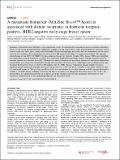A metastasis biomarker (MetaSite Breast™ Score) is associated with distant recurrence in hormone receptor-positive, HER2-negative early-stage breast cancer
Author(s)
Sparano, Joseph A.; Gray, Robert; Oktay, Maja H.; Entenberg, David; Rohan, Thomas; Xue, Xiaonan; Donovan, Michael; Peterson, Michael; Shuber, Anthony; Hamilton, Douglas A.; D’Alfonso, Timothy; Goldstein, Lori J.; Gertler, Frank; Davidson, Nancy E.; Condeelis, John; Jones, Joan; ... Show more Show less
Downloads41523-017-0043-5.pdf (686.8Kb)
PUBLISHER_CC
Publisher with Creative Commons License
Creative Commons Attribution
Terms of use
Metadata
Show full item recordAbstract
Metastasis is the primary cause of death in early-stage breast cancer. We evaluated the association between a metastasis biomarker, which we call "Tumor Microenviroment of Metastasis" (TMEM), and risk of recurrence. TMEM are microanatomic structures where invasive tumor cells are in direct contact with endothelial cells and macrophages, and which serve as intravasation sites for tumor cells into the circulation. We evaluated primary tumors from 600 patients with Stage I-III breast cancer treated with adjuvant chemotherapy in trial E2197 (NCT00003519), plus endocrine therapy for hormone receptor (HR)+ disease. TMEM were identified and enumerated using an analytically validated, fully automated digital pathology/image analysis method (MetaSite Breast™), hereafter referred to as MetaSite Score (MS). The objectives were to determine the association between MS and distant relapse free interval (DRFI) and relapse free interval (RFI). MS was not associated with tumor size or nodal status, and correlated poorly with Oncotype DX Recurrence Score (r = 0.29) in 297 patients with HR+/HER2- disease. Proportional hazards models revealed a significant positive association between continuous MS and DRFI (p = 0.001) and RFI (p = 0.00006) in HR+/HER2- disease in years 0-5, and by MS tertiles for DRFI (p = 0.04) and RFI (p = 0.01), but not after year 5 or in triple negative or HER2+ disease. Multivariate models in HR+/HER- disease including continuous MS, clinical covariates, and categorical Recurrence Score (<18, 18-30, > 30) showed MS is an independent predictor for 5-year RFI (p = 0.05). MetaSite Score provides prognostic information for early recurrence complementary to clinicopathologic features and Recurrence Score.
Date issued
2017-11Department
Massachusetts Institute of Technology. Department of BiologyJournal
npj Breast Cancer
Publisher
Springer Nature
Citation
Sparano, Joseph A., et al. “A Metastasis Biomarker (MetaSite Breast™ Score) Is Associated with Distant Recurrence in Hormone Receptor-Positive, HER2-Negative Early-Stage Breast Cancer.” Npj Breast Cancer, vol. 3, no. 1, Dec. 2017.
Version: Final published version
ISSN
2374-4677